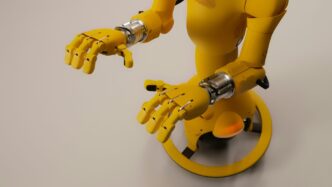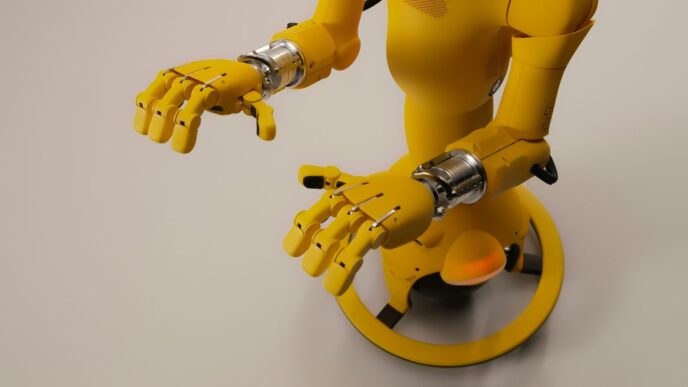Thinking about using an AI doctor? It’s a pretty new idea for a lot of us, but honestly, it’s becoming more common for getting quick health advice. These AI assistants can be super handy, offering fast and sometimes free answers to your health questions. This guide is here to help you figure out how to use these AI tools to manage your health better. Whether you’re a tech whiz or just curious, we’ll cover the basics of finding the best AI doctor for your needs.
Key Takeaways
- AI medical tools are changing how we get health advice, offering quick and accessible consultations.
- While not a replacement for human doctors, AI assistants can provide initial assessments and information for minor health concerns.
- Many free AI health services and symptom checkers are available online and via apps, but it’s important to choose reputable platforms.
- AI in healthcare works by processing vast amounts of data to identify patterns and suggest information, but it lacks human empathy and judgment.
- The future of AI in medicine involves assisting doctors, improving research, and making healthcare more efficient, but human oversight remains vital.
Understanding the Rise Of The Best AI Doctor
The AI Medical Revolution Unveiled
It feels like everywhere you look these days, AI is popping up, and healthcare is no exception. We’ve moved way past the clunky computers and piles of paper charts from years ago. Now, in 2025, AI is becoming a pretty big deal in how doctors figure out what’s wrong, how they write things down, and how they help people get better. But here’s the thing: not all these AI tools are the same, and not every flashy app actually helps doctors spend more time with their patients. If you’re wondering what the best AI for doctors looks like right now, you’re not alone. A report from last year showed that over 78% of doctors are either using AI tools or looking into them, but almost half feel a bit lost with all the choices. That’s why we’re here – to cut through the noise and give you a real look at how these smart tools are changing a doctor’s day-to-day work.
Core Technologies Driving Medical AI
So, what’s actually making all this AI stuff work in medicine? It’s a mix of smart computer programs that can learn and figure things out. Think of it like this:
- Machine Learning: This is a big one. It’s how AI systems learn from huge amounts of data, like patient records or medical images, to spot patterns that humans might miss. The more data they see, the better they get at things like predicting diseases or suggesting treatments.
- Natural Language Processing (NLP): This is what lets AI understand and work with human language. It’s how AI can read doctor’s notes, listen to patient conversations (with permission, of course), and even help write summaries or suggest medical codes.
- Computer Vision: This technology allows AI to ‘see’ and interpret images, like X-rays, CT scans, or MRIs. It can help radiologists by highlighting areas that might need a closer look, acting like an extra pair of eyes.
These technologies work together to help AI assistants process information much faster than a person could, which is a big part of why they’re becoming so popular.
Why AI Is Becoming Healthcare’s New Favorite Assistant
Gone are the days of doctors spending their evenings buried in paperwork. AI is stepping in like that super-efficient colleague who just gets things done without any fuss. It’s helping doctors with tasks like suggesting the right medical codes, drafting patient notes, or summarizing visits. This means doctors can spend less time typing and more time actually talking to and caring for their patients. This shift back to human connection is one of the biggest wins AI is bringing to healthcare right now. When AI handles some of the administrative load, doctors can focus on what truly matters: the patient in front of them. It’s not about replacing doctors; it’s about giving them better tools to do their jobs more effectively and with more personal touch.
Leveraging AI For Your Health Concerns
So, you’re curious about how these AI health tools can actually help you day-to-day? It’s not just about fancy tech; it’s about making your health management a bit easier and maybe even a little less stressful. Think of them as helpful assistants, not replacements for your doctor, but useful for getting quick insights or keeping track of things.
When To Consider An AI Doctor
There are definitely times when an AI health assistant can be a good first step. If you’ve got a nagging worry about a minor symptom, or if it’s late at night and you’re wondering if that cough is just a cold or something more, an AI can offer some initial thoughts. It’s also handy if you have a busy schedule and can’t easily get to a clinic for a quick question. These tools are great for getting preliminary information before deciding on your next move. They can help you figure out if you need to book an appointment, try some home care, or just keep an eye on things.
How AI Doctors Process Your Health Queries
When you type in your symptoms or ask a health question, the AI gets to work. It uses something called natural language processing to understand what you’re saying. Then, it sifts through a huge amount of medical information it’s been trained on. It looks for patterns and connections between your description and known conditions or advice. It’s like a super-fast librarian who knows all the medical books. Based on this, it will suggest possible causes for your symptoms and what steps you might consider next. It’s important to remember that this is based on data, not personal experience or a physical examination.
Integrating AI Into Your Personal Healthcare Routine
Getting started with AI health tools doesn’t have to be complicated. Here’s a simple way to begin:
- Start Small: Pick one tool, maybe a symptom checker for common issues like headaches or stomach upset. Use it for minor things first to get a feel for how it works.
- Be Specific: When you use a tool, give it as much detail as you can about your symptoms. The more information you provide, the better the AI can analyze your situation.
- Compare and Contrast: If you’re using an AI for chronic condition management, like tracking your blood sugar, see how its suggestions compare to what your doctor has told you. Always discuss any significant changes or concerns with your human doctor.
- Prioritize Security: When choosing apps or platforms, look for ones that mention data privacy and security. You want to feel comfortable sharing your health information.
Finding Accessible AI Health Consultations
It feels like everywhere you look these days, there’s some new AI tool popping up, and healthcare is no different. You might be wondering how you can actually get your hands on these AI health assistants without breaking the bank or signing up for a bunch of complicated services. The good news is, there are quite a few ways to try them out, and many are surprisingly easy to find and use.
Where To Discover Free AI Health Services
Lots of companies are putting out free versions of their AI health tools. Think of it like a free sample – they want you to try it out. You can often find these through dedicated health apps or even as features within larger tech platforms. Some are completely free, while others might give you a taste of what they can do for free and then ask you to pay for more detailed help. It’s a good way to get initial advice for those nagging questions you have.
Here are a few places to start looking:
- Health Apps: Many mobile apps focus on specific health areas and include AI-powered symptom checkers or chatbots. You can usually find these in your phone’s app store.
- Web-Based Tools: Websites from established health information providers often have free AI symptom checkers. Just type in your symptoms and see what comes up.
- Startup Platforms: Newer companies in the digital health space frequently offer free access to their AI tools as they build their user base.
Choosing Reputable AI Healthcare Platforms
Okay, so you’ve found a few places to try. But how do you know if you can trust them? This is super important because you’re talking about your health. Always check who is behind the AI tool and what their privacy policy says. You want to make sure your personal health information is kept safe and isn’t being shared without your permission. Look for platforms that are clear about how they use data and mention things like HIPAA compliance if they’re in the US. It’s also a good sign if they clearly state that the AI is not a replacement for a real doctor.
Navigating AI Symptom Checkers And Chatbots
Using these tools is usually pretty straightforward. You’ll typically type in what you’re feeling, maybe answer a few follow-up questions the AI asks, and then it will give you some possibilities. It’s kind of like talking to a very knowledgeable, but very literal, assistant. They’re great for getting a general idea of what might be going on, especially for common issues. For example, if you have a cough and a fever, an AI might suggest a cold or the flu. It can help you decide if you need to make a doctor’s appointment or if you can probably manage at home with some rest and over-the-counter medicine. Just remember, it’s a starting point, not the final word on your health.
The Role Of AI In Clinical Practice
So, how is AI actually showing up in doctor’s offices and hospitals right now? It’s not just about fancy robots; it’s about making things work better for everyone involved. Think of AI as a really smart assistant that helps doctors and nurses do their jobs more effectively. It’s not here to take over, but to lend a hand where it counts.
AI As A Partner In Diagnosis And Treatment
When it comes to figuring out what’s wrong and how to fix it, AI can be a huge help. Doctors deal with so much information, and AI can sift through it all at lightning speed. For example, in radiology, an AI can look at an X-ray or MRI and point out tiny details that a human eye might miss, especially after a long day. It’s like having a second pair of eyes that never get tired.
- Spotting subtle signs: AI can identify early indicators of diseases that might be hard to see at first glance.
- Reviewing patient history: It can quickly scan a patient’s records for potential drug interactions or allergies before a treatment plan is made.
- Suggesting treatment paths: Based on vast amounts of medical data, AI can offer potential treatment options for doctors to consider.
This doesn’t mean the AI makes the final call. The doctor still uses their own knowledge and experience, but the AI provides extra information to make that decision more solid. It’s a team effort, really.
Enhancing Clinical Precision And Accuracy
Accuracy is everything in medicine, right? AI is really good at being precise. It can analyze huge amounts of data, like thousands of medical images or patient charts, and find patterns that humans might not notice. This helps make diagnoses more consistent. Instead of relying solely on one doctor’s interpretation, AI can provide a more standardized review.
Imagine an AI looking at a scan and saying, "Hey, there’s a small spot here that looks a bit unusual. You might want to take a closer look." This helps catch problems earlier, when they’re often easier to treat. It’s about reducing errors and making sure patients get the best possible care, every time.
AI’s Impact On The Patient-Physician Relationship
This is a big one. You might worry that AI will make healthcare feel cold and impersonal. But the idea is actually the opposite. By taking over some of the more time-consuming, data-heavy tasks, AI can free up doctors and nurses. This means they can spend more quality time talking with patients, listening to their concerns, and building that important trust. When doctors have more time, they can focus on the human side of healing. It’s about using technology to make the human connection even stronger, not weaker. So, while AI handles the data, doctors can focus on you.
Navigating The Limitations Of AI Medical Assistants
Okay, so we’ve talked a lot about how cool AI doctors can be, right? They can sort through info super fast and help us figure things out. But, and this is a big ‘but’, they aren’t perfect. Not by a long shot.
Understanding AI’s Inability To Replace Human Empathy
This is probably the most obvious one. An AI can’t give you a comforting pat on the back or really get how you’re feeling. It can process symptoms and data, sure, but it doesn’t have feelings. It can’t offer that genuine human connection that a doctor or nurse provides. Think about it: when you’re really sick or worried, you want someone who can listen with compassion, not just a program spitting out facts. That emotional support is a huge part of healing, and AI just can’t replicate it. It’s like comparing a really good recipe to a home-cooked meal made by someone who loves you – one is functional, the other has soul.
The Importance Of Data Quality For AI Accuracy
AI is only as good as the information it’s fed. If you tell an AI checker you have a headache and a sore throat, and you actually have a rash and fever, the AI’s advice is going to be way off. It’s like trying to get directions from someone who’s only been given half the map. The more detailed and accurate you are with your input, the better the AI can work. But even then, there’s always a chance of misinterpretation or missing subtle clues that a human doctor would pick up on.
Here’s a quick look at how input affects output:
| Input Detail | Potential AI Output |
|---|---|
| Vague symptoms (e.g., "feeling tired") | General advice, possibly unhelpful |
| Specific symptoms (e.g., "fatigue, shortness of breath, chest pain") | More targeted suggestions, but still requires careful interpretation |
| Detailed medical history + specific symptoms | Best chance for accurate AI suggestions, but still not a diagnosis |
Addressing Complex Cases Beyond AI Capabilities
Sometimes, medical issues are really complicated. They might involve rare conditions, multiple overlapping problems, or situations that require a doctor to use their gut feeling and years of experience. AI is still pretty new to this whole medical game. It’s great for common stuff and processing lots of data, but when things get really tricky, it can hit a wall. It might not be able to connect the dots in the same way a seasoned physician can, especially when dealing with conditions that don’t fit neatly into a database. So, while AI can be a fantastic assistant, it’s not quite ready to handle every single medical puzzle on its own.
The Future Of AI In Healthcare
It’s pretty clear that AI isn’t just a passing fad in medicine; it’s becoming a core part of how we’ll get care. We’re moving away from just fixing problems when they pop up and heading towards a system that tries to prevent them before they even start. This shift is huge.
AI’s Growing Role In Medical Research
Think about how long it usually takes to find new drugs. Years, right? And it costs a fortune. AI is changing that game. By simulating how different compounds might work in the body, AI can find promising drug candidates way faster – we’re talking months instead of years. This means new medicines could get to people who need them much sooner. It’s like giving researchers a super-powered shortcut.
Potential For AI To Improve Patient Outcomes
When AI helps doctors catch diseases earlier, like spotting tiny signs on scans that might be missed otherwise, treatment can start sooner. And when treatment starts early, it’s often more effective. This whole process, from quicker diagnosis to more precise treatment plans, is what leads to better results for patients. It’s not just about technology; it’s about making people healthier.
The Evolving Landscape Of Medical AI Tools
We’re seeing AI pop up in more and more places. Wearable devices, like smartwatches, are constantly collecting health data. AI can make sense of all that information – your sleep patterns, your activity levels, your heart rate. It can spot subtle changes that might hint at a problem weeks before you even feel sick. This means we can have more personalized health advice and focus on staying well. On a bigger scale, AI is even helping predict disease outbreaks, so health organizations can get ready and respond faster. It’s a pretty exciting time for medical tech.
So, What’s the Takeaway?
Alright, so we’ve talked a lot about these AI doctors and how they’re popping up everywhere. It’s pretty wild to think about getting medical advice from a computer program, right? But honestly, it’s not really about replacing your actual doctor. Think of it more like having a super-smart assistant ready to help out. These tools can be great for getting quick answers to simple questions or just figuring out if you really need to see a human doctor. Just remember, they’re still learning, and they don’t have that human touch or all your personal history. So, use them wisely, keep your privacy in mind, and always, always check with a real doctor for anything serious. It’s all about using these new tools to make your health journey a little bit easier.












